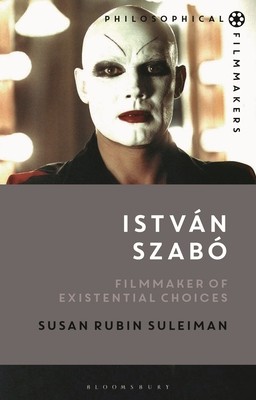
- We will send in 10–14 business days.
- Author: Susan Rubin Suleiman
- Publisher: Bloomsbury Academic
- ISBN-10: 1350181838
- ISBN-13: 9781350181830
- Format: 14 x 21.6 x 1.3 cm, hardcover
- Language: English
- SAVE -10% with code: EXTRA
Reviews
Description
István Szabó is one of the few Hungarian filmmakers to have earned a major international reputation over the past half century. His 1981 film, Mephisto, was the first film by a Hungarian director to be awarded the Academy Award for Best Foreign Film, and he has directed more than 15 feature films, in Hungarian, German, and English starring actors like Ralph Fiennes, Glenn Close, Annette Benning and Helen Mirren,
Yet Szabó's importance as a filmmaker lies not so much in his attention to film's formal elements, but for his deep and ongoing engagement with some of the most urgent ethical and existential questions of our time. He is not a philosopher in the technical sense of the word, but his films are undoubtedly philosophical through the questions they ask. How do individuals attempt, and often fail, to create a viable self and a life in extreme historical situations over which they have no control? This is probably the single most profound philosophical question that haunts Szabó's work, as indeed it does that of many other Central European intellectuals and filmmakers of the 20th century.EXTRA 10 % discount with code: EXTRA
The promotion ends in 19d.18:40:43
The discount code is valid when purchasing from 10 €. Discounts do not stack.
- Author: Susan Rubin Suleiman
- Publisher: Bloomsbury Academic
- ISBN-10: 1350181838
- ISBN-13: 9781350181830
- Format: 14 x 21.6 x 1.3 cm, hardcover
- Language: English English
István Szabó is one of the few Hungarian filmmakers to have earned a major international reputation over the past half century. His 1981 film, Mephisto, was the first film by a Hungarian director to be awarded the Academy Award for Best Foreign Film, and he has directed more than 15 feature films, in Hungarian, German, and English starring actors like Ralph Fiennes, Glenn Close, Annette Benning and Helen Mirren,
Yet Szabó's importance as a filmmaker lies not so much in his attention to film's formal elements, but for his deep and ongoing engagement with some of the most urgent ethical and existential questions of our time. He is not a philosopher in the technical sense of the word, but his films are undoubtedly philosophical through the questions they ask. How do individuals attempt, and often fail, to create a viable self and a life in extreme historical situations over which they have no control? This is probably the single most profound philosophical question that haunts Szabó's work, as indeed it does that of many other Central European intellectuals and filmmakers of the 20th century.

Reviews